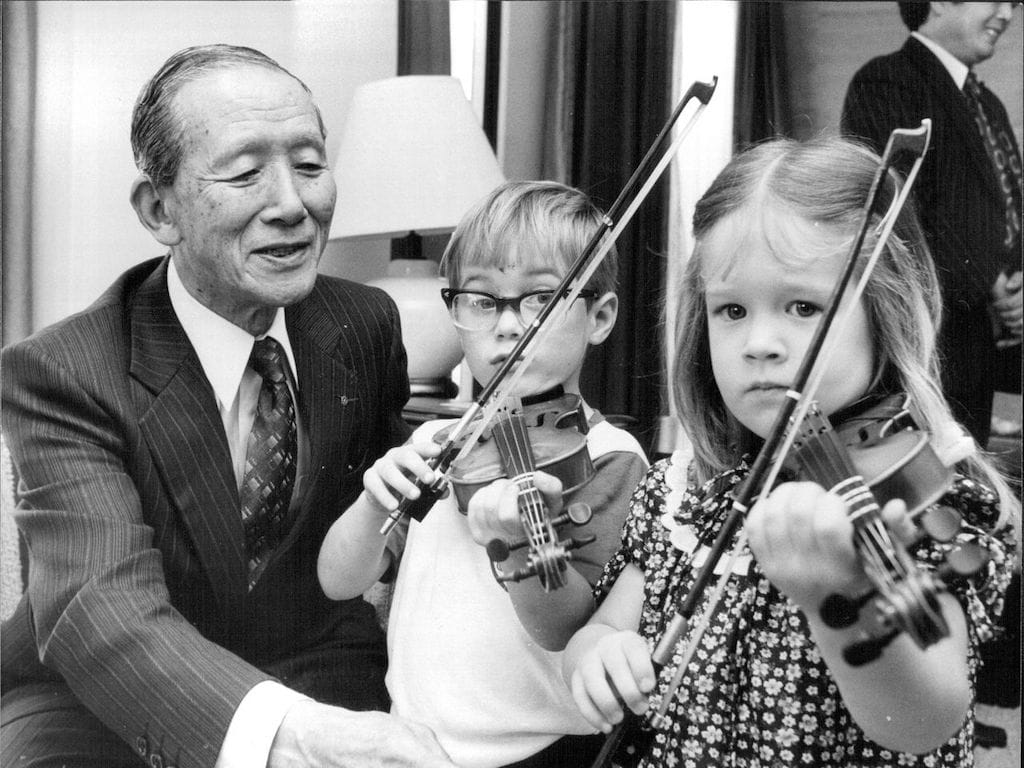The Suzuki Approach to Education and the 10,000-Hour Rule

“He’s extremely talented.” “She doesn’t have the talent for singing.” We’ve all heard variants of these comments, even if we haven’t necessarily said them ourselves.
The dictionary definition of ‘talent’ is “a natural aptitude or skill.” It implies that one is either born with it or one isn’t, like some genetic luck of the draw.
The Japanese violinist, philosopher and educator Shinich Suzuki (1898-1998) is world-renowned as founder of the international Suzuki ‘method’ of music education for people of all ages, abilities and backgrounds.
As someone involved in music education myself since the inception of our music charity Child’s Play India Foundation and having experienced first-hand the use of the Suzuki method in our children and elsewhere, I found the book ‘Suzuki: The Man and his Dream to Teach the Children of the World’ (Harvard University Press 2022) by Japanese-American historian Eri Hotta a fascinating read.
Suzuki disliked the word ‘method’ to qualify his teaching. His goal was “not education of the violin, but education by the violin.” It embraced “all children, of great or small potential, whether it lay in music” or elsewhere. “To Suzuki, the achievement of a certain level of mastery on the violin was only an example – albeit a powerful one – of what any or all children could accomplish with proper guidance from an early age.”
Hotta delves deeply into “the loaded and cherished concept of talent” and feels Suzuki doesn’t address it very effectively, leading “to more questions than answers.”
Talent Education is an important feature of the Suzuki philosophy. But Hotta asks “why focus on talent instead of something neutral, like ability? Why try to democratise a concept universally understood as exclusionary, even as less value-laden concepts also exist?”
Furthermore, she tells us, in Japanese, ‘talent’ is etymologically related to ‘genius’. The Japanese character for ‘genius’ literally means ‘heaven-sent talent.’
The English word comes from the Greek ‘talanton’, signifying a unit of weight or sum of money. It therefore implies something quantitative, something one has more or less of. Suzuki rejected this notion. He felt all children, irrespective of background and individual differences, should be measured against their own “raw” abilities, not anyone else’s. He believed that “we can all become talented in our own ways.” To him, talent is not a static inherited quality like, say, eye colour. Rather, talent is like a muscle that can be exercised and strengthened.
To support his argument, Suzuki pointed to the universal capacity for language acquisition among children, being able to speak and understand the language(s) that surrounded them at an early age. He felt that this ability could be applied to general education, not just music.
Children pick up languages from parents and society in “a spirit of love, patience and self-reflection.” That same spirit, if applied to all education, would give just as astounding results.
Suzuki saw from experience that the existing notions of ‘talent’ (and also other labels like ‘genius’ and ‘prodigy’) were actually harmful to children and society at large.
“Students who believed in their own talent were at risk of becoming egotists, and parents who believed in their children’s talent became obsessed and hypercompetitive, provoking destructive rivalries and damaging their children emotionally and morally.”
He therefore believed that “no child should be called a genius in music or in any other pursuit.”
To Suzuki, ‘innate potential’ and ‘raw aptitude’ were inborn, while “talent came to those who stretched their latent potential through nurture and effort.”
Although today he is remembered for the Suzuki ‘method’, a system for teaching the learning the violin and other instruments, what he intended and introduced in 1941 and drove his life’s work was much more than that: “talent education aimed at nothing less than a social revolution.”
According to Suzuki there were no education drop-outs in this world; only “dropped-outs” who had been compromised by adults.
Malcolm Gladwell’s bestselling 2008 book ‘Outliers’ examines the factors that contribute to high levels of success. A common theme throughout the book is the’10,000-Hour Rule’ based on a 1993 study by Andres Ericsson and others. In their groundbreaking paper ‘The Role of Deliberate Practice in the Acquisition of Expert Performance’, they assert that “Many characteristics once believed to reflect innate talent are actually the result of intense practice.” Suzuki’s ‘Talent Education’ (1941) had made this point over half a century earlier.
Ericsson et al observe: “The search for stable heritable characteristics that could predict or at least account for the superior performance of eminent individuals has been surprisingly unsuccessful.” However, they continue,” The conviction in the importance of talent appears to be based on the insufficiency of alternative hypotheses to explain the exceptional nature of expert performance.”
But, you may think, what harm could there be in using the word ‘talent’ or ‘talented’ if it is well-intentioned, right? It seems like such a harmless, nice compliment. But the word can cut both ways, and even play psychological mind-games with parents, teachers and students, as Suzuki himself observed nearly a century ago now.
The label ‘talented’ in the best-case scenario can spur the child, parents and teachers to work even harder at that skill. But if all it does is convey the notion that the child has ‘already got it’, it can foster complacency, lulling one into thinking that one needn’t work so hard if the magic is ‘already there.’
The consequences can be demoralising for the support system of those typecast as ‘less talented’ or ‘not talented’. It can sap the energy and confidence of that child, and parents and teachers may well decide not to invest so much time, energy and effort (and let’s face it, expense for lessons and commuting to and fro) on what can be erroneously perceived at least subconsciously, as a ‘lost cause.’
The biggest obstacle to any ‘extra-curricular’ pursuit in India, be it music, drama, sport or whatever, is the staggering academic burden, from school through college to higher studies. Families have to make superhuman sacrifices to achieve the right balance, doing justice to both without neglecting one in favour of the other.
There have been critics of the 10,000-Hour ‘Rule’. My reading of the data behind it is that expert performers put in the hard work to get there. It doesn’t mean that mindless clocking of hours is a passport to success. If the hours of practice are not focussed and intelligently structured, they will not be useful. But if those conditions are met, then it is only logical that the earlier in life one begins the pursuit the better. Precious years in the lives of our children unnecessarily slip by because parents are not mindful of the advantages of starting out early.
It is no coincidence that there are families with a ‘tradition’ of sport or music, etc. We could facilely assume the trait is hereditary, that the child is “a born musician or sportsperson.” But it can also be interpreted as the early beginning of those 10,00 hours due to a favourable nurturing milieu for that pursuit in that familial environment.
If you are a parent reading this, the earlier you detect, nurture and channel your child’s “raw ability”, the better.
This article first appeared in The Navhind Times, Goa, India.





